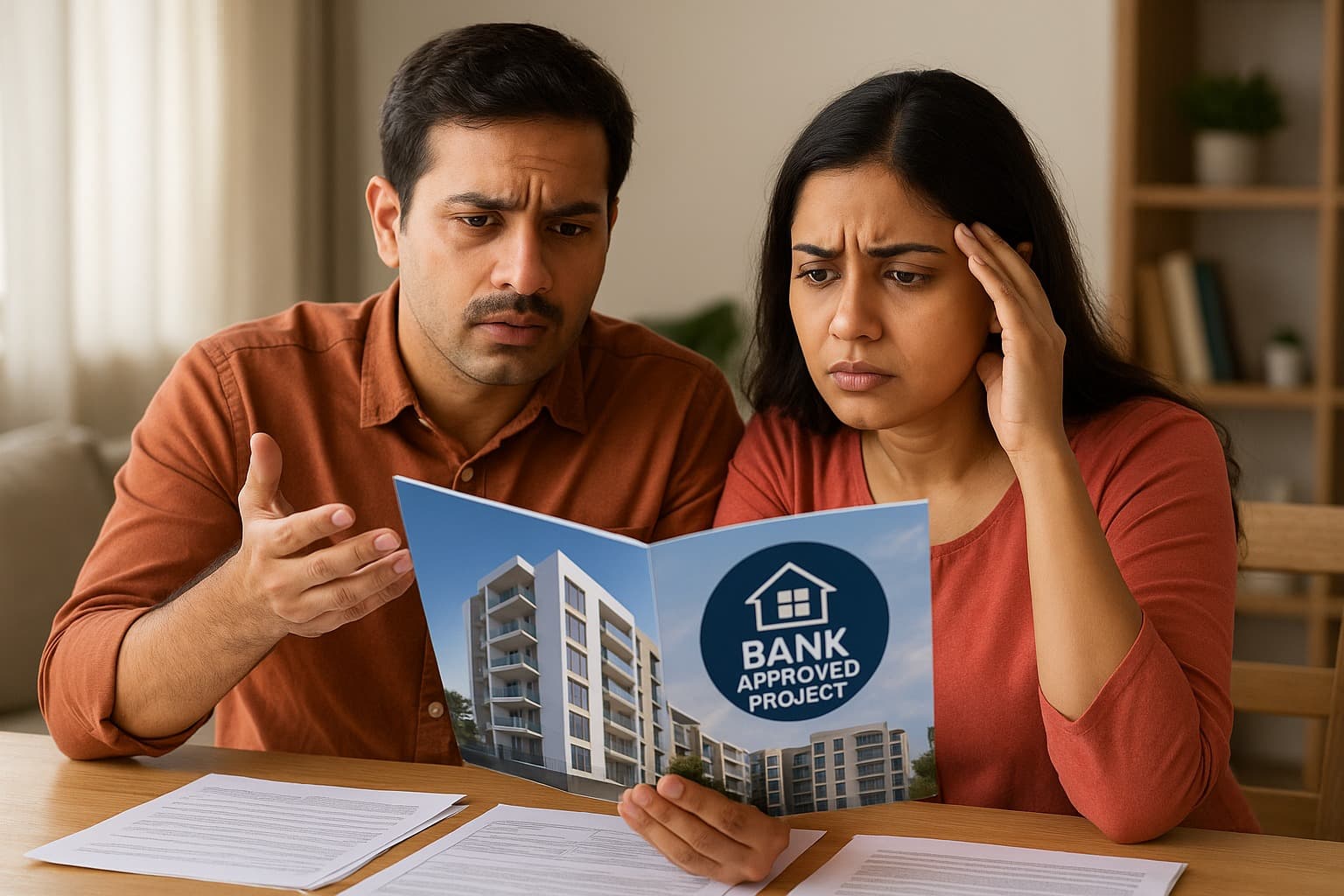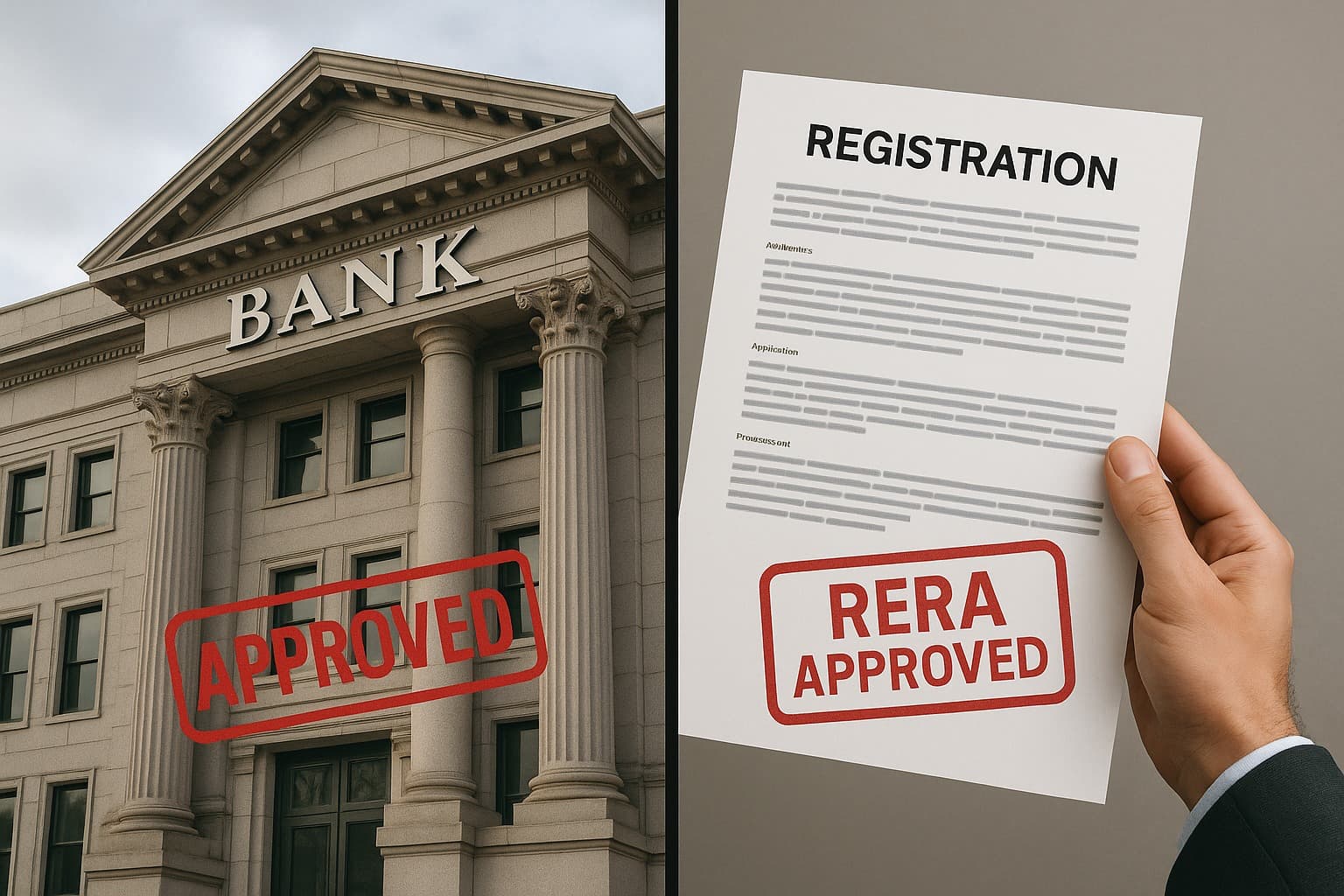"Bank-Approved" Real Estate Projects in India: Safety Net or Marketing Gimmick?
Summary
Bank-approved real estate projects in India offer faster loans and basic vetting but aren't guarantees of safety. Buyers should conduct their own legal due diligence and check RERA registration for secure investments.

"Bank-Approved" Real Estate Projects: A Safety Net or Just Slick Marketing?
Let's be real. Buying a home in India feels like one of those high-stakes board games. You’ve got the dream, the savings, and the endless Google searches for "property buying tips." Then you stumble upon an ad for a new project, and the phrase "Bank-Approved" jumps out at you. Instantly, a little voice in your head goes, "Oh, thank goodness! The banks have checked it out. It must be safe."
But hold on a second. Does that stamp of approval from a bank actually mean your investment is bulletproof? Or is it just another trick in the developer's book to get you to sign on the dotted line? This question is a classic in the real estate market of India, and it's one we need to unpack.
When you're trying to figure out what are bank-approved projects in real estate, the answer isn’t as simple as it seems. It's not a free pass to skip your own homework. Let's dig into the nitty-gritty and see if this is a genuine safety check or just a clever marketing gimmick.
The Great Bank-Approved Illusion
Picture this: You’re hunting for a flat. Maybe you’re looking at bank-approved flats for sale in Mumbai. The developer's brochure has all the glossy photos, the promises of a great lifestyle, and then that small but significant logo of a major bank. It’s comforting, right? It makes the whole process of getting a home loan India feel less intimidating. You think, "If HDFC or SBI trusts this project enough to lend money, I should too."
This is the exact psychological trick developers are banking on. The phrase "bank-approved" is meant to give you a shortcut to trust. It suggests that a big, powerful financial institution has already done the heavy lifting, saving you from the dreaded legal and technical checks. But is that what’s really happening?
The Bank's Perspective vs. Yours
When a bank "approves" a project, they're not doing it for your peace of mind. They're doing it to protect their own money. Their due diligence is all about mitigating their risk, not yours. Here’s a quick rundown of what a bank's legal and technical team checks:
Legal Standing: They verify the land titles. Is the developer the rightful owner? Are there any existing disputes or encumbrances?
Regulatory Clearances: They check for basic approvals like building plans and environmental sanctions from local authorities.
Financial Health: They look at the developer's financial track record. Are they stable? Have they completed projects on time in the past?
Basically, they're asking, "If we lend money to a hundred people for this project, will we get our money back?" If the answers are "yes," they put the project on their list. This makes your home loan eligibility and bank-approved projects explained together a much smoother process. You, as the buyer, benefit because the bank has already vetted the most basic things, making your loan application much faster.
The RERA Reality Check
This is where things get interesting. Many people confuse bank approval with RERA approved projects. It’s like confusing a driver’s license with a car’s fitness certificate—they're related, but totally different things.

RERA (Real Estate Regulation and Development Act, 2016) is a government body created to be your shield. A RERA-approved project means the developer has registered it with the state authority and must follow a strict set of rules designed to protect you, the buyer. These rules include:
Timely completion with penalties for delays.
Transparency in project details.
Keeping project funds in a separate account to prevent diversion.
The difference between bank approval and RERA approval is massive. Bank approval is a commercial decision; RERA approval is a regulatory mandate. A project could be bank-approved but not RERA-registered (a huge red flag!), and vice versa. Ideally, you want both.
So, Is Bank Approval a Guarantee?
Let's cut to the chase: Does bank approval guarantee safe property investment? Absolutely not. It’s a helpful signal, but it’s not the gospel truth.
I’ve seen projects that were "bank-approved" and still got stalled due to a developer’s financial issues. I’ve seen others get tangled up in legal disputes that the bank's initial check might have missed. A bank's due diligence is thorough for its own purpose, but it can’t see the future.
This is why the battle of bank approved real estate projects vs legal due diligence is one you must wage yourself. Your own legal and technical checks are non-negotiable.
The Honest Pros and Cons
Let's break down the pros and cons of bank approved projects so you can make an informed decision.
Pros:
Faster Loans: Getting a home loan India is quicker and less of a headache.
Basic Vetting: It shows that the developer isn't a total fly-by-night operator.
Peace of Mind (a little): You can feel slightly more secure knowing a bank has done some checks.

Cons:
It’s Not for You: The checks are for the bank’s benefit, not yours.
No Guarantee of Completion: The project can still be delayed or abandoned.
Hidden Problems: It doesn’t eliminate the risk of legal or technical issues popping up later.
Your Action Plan
So, how to check if a project is bank approved or not? Just ask the developer. They'll probably give you a list of banks. You can call the banks to cross-verify. But this is just step one.
Should you trust bank approved real estate projects? You should trust them as much as you'd trust a friend's recommendation – with a healthy dose of your own research.
Here’s your no-BS checklist:
Check RERA First, Always: Go to your state's RERA website and check the project registration. If it's not there, walk away.
Get a Lawyer: Hire a professional to do a full legal due diligence. They'll check every document, from the title deed to the building plans.
Visit the Site (Again and Again): Don’t just go once. Go on a weekday, on a weekend. See the pace of construction. Talk to people there.
Google the Developer: Don't just look at their official site. Read forums, news articles, and reviews. See their reputation.
Summary
So, are bank-approved projects safe for property buyers in India? They are safer than non-approved projects, but they are by no means a guarantee. The term "bank-approved" is a fantastic piece of marketing that makes the loan process easier and gives you a preliminary sense of security. But it's not a substitute for your own rigorous legal and financial homework.
In the end, while the banks have done their due diligence for their own money, your hard-earned cash deserves the same level of scrutiny. In the world of real estate India, the most important safety check is the one you do yourself. Rely on bank approval for a smoother loan process, but rely on your own legal due diligence for a truly safe investment.
Video will be embedded from: https://youtu.be/m5s5g4amOn0
